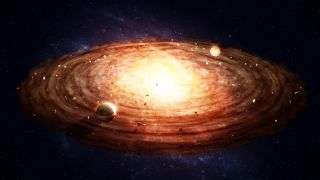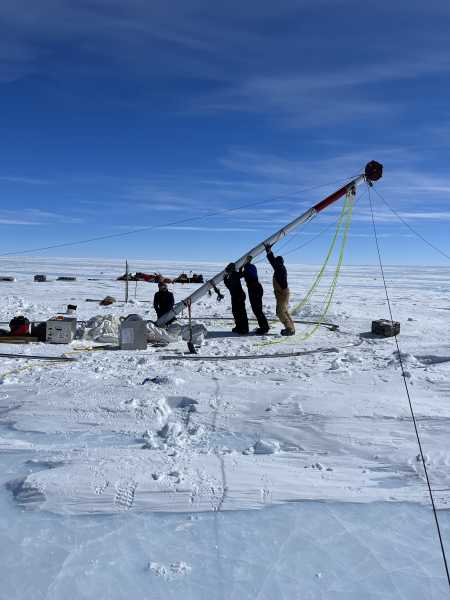
An illustration of the protoplanetary disk around our sun.
Dust from meteorites that crash-landed on Earth have revealed that Earth’s precursor, known as proto-Earth, formed much faster than previously thought, a new study finds.
An analysis of this meteorite dust showed that proto-Earth formed within about 5 million years, which is extremely fast, astronomically speaking.
Put another way, if the entire 4.6 billion years of the solar system’s existence were compressed into a 24-hour period, proto-Earth formed in just 1 minute and 30 seconds, the researchers said.
The new finding breaks with the previously held idea that proto-Earth formed when larger and larger planetary bodies randomly slammed into one another, a process that would have taken several tens of millions of years, or about 5 to 15 minutes in the fictional 24-hour timescale.
In contrast, the new idea holds that planets formed through the accretion of cosmic dust, a process in which dust attracts more and more particles through gravity. “We start from dust, essentially,” study lead researcher Martin Schiller said in a statement. Schiller is an associate professor of geochemistry at the Centre for Star and Planet Formation (StarPlan) at the University of Copenhagen’s Globe Institute, in Denmark.
With accretion, millimeter-size particles would have come together, “raining down on the growing body and making the planet in one go,” Schiller said.
Schiller and his colleagues made the finding by studying iron isotopes, or different versions of the element iron, in meteorite dust. After looking at iron isotopes in different types of meteorites, they realized that only one type had an iron profile that was similar to Earth’s: the CI chondrites, which are stony meteorites. (The “C” stands for carbonaceous and the “I” stands for Ivuna, a place in Tanzania where some CI meteorites are found.)
The dust in these CI chondrites is the best approximation out there for the solar system’s overall composition, the researchers said. In the solar system’s early days, dust like this joined with gas and both were funneled into a accretion disk orbiting the growing sun.
Over the course of 5 million years, the solar system’s planets formed. According to the new study, the proto-Earth’s iron core also formed during this time, snatching up accreted iron from the proto-planet’s mantle. Eventually, this proto-planet became the Earth we know today.
Message from Mars
Meteorites from Mars tell scientists that, in the beginning, the composition of iron isotopes in the material making up Earth were different than they were later on. This likely happened because heat from the young growing sun altered them, the researchers said.
After a few hundred thousand years passed, the area where Earth was forming became cold enough for unheated CI dust that came from farther away to become part of proto-Earth’s accretion disc.
Given that iron from this far away dust is found in Earth’s mantle today, it makes sense that “most of the previous iron was already removed into the core,” Schiller said. “That is why the core formation must have happened early.”
The other idea — that Earth formed when planetary bodies randomly collided with one another — doesn’t hold, he said. “If the Earth’s formation was a random process where you just smashed bodies together, you would never be able to compare the iron composition of the Earth to only one type of meteorite,” Schiller said. “You would get a mixture of everything.”
The new finding may also apply to other planets in the universe, the researchers noted. In essence, this means that other planets may grow much faster than previously realized. In fact, there is already evidence that this is likely the case, according to data on thousands of exoplanets in other galaxies, said study co-researcher Martin Bizzarro, a professor at StarPlan.
“Now we know that planet formation happens everywhere,” Bizzarro said in the statement. “When we understand these mechanisms in our own solar system, we might make similar inferences about other planetary systems in the galaxy.”
This process may even explain when and how often water is accreted during planet formation.
“If the theory of early planetary accretion really is correct, water is likely just a by-product of the formation of a planet like the Earth,” Bizzarro said. “Making the ingredients of life, as we know it, [is] more likely to be found elsewhere in the universe.”
The study was published online Feb. 12 in the journal Science Advances.
Sourse: www.livescience.com





